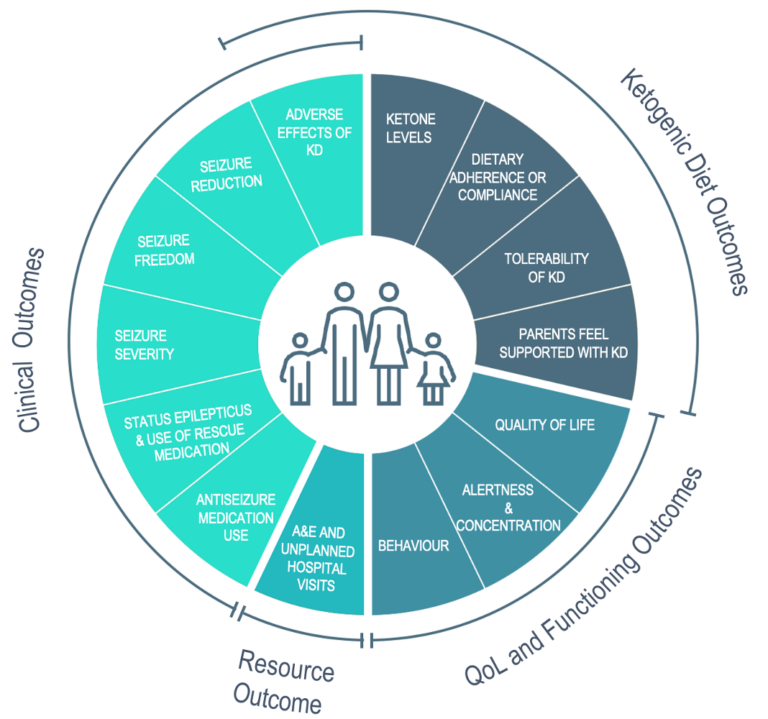Research
The CORE-KDT study aimed to identify the most important outcomes to measure for children with epilepsy treated with the ketogenic diet.

Research often uses seizure control and the side effects of a ketogenic diet as the main way of assessing ketogenic diet therapy. These are known as ‘outcomes’ or results. However, we also think it is vital to consider outcomes that are important to the children receiving treatment and their parents. Prior to this study, there had been no unified attempt to assess patient and parent views regarding the choice of outcomes, and consequently, there was no consensus among healthcare professionals, patients, parents and researchers regarding the outcomes that should be measured and reported.
The CORE-KDT study aimed to address this issue by developing a core outcome set, which is a minimum group of outcomes that should be prioritised in future research and clinical practice.
Jen has presented the findings of the CORE-KDT study at many conferences and meetings. You can view her presentation at the Nutricia KetoConference 2023 in Newcastle for an overview of the findings from the CORE-KDT study.
The CORE-KDT study answers several important questions

What outcomes are measured in research studies?
We assessed the outcomes measured in studies of childhood epilepsy treated with ketogenic diet to determine what outcomes were measured. There was little consistency in the range of outcomes used in childhood epilepsy and KD therapy research. Physiological and clinical outcomes such as seizure control and adverse effects were most often measured. Social, emotional, physical, and cognitive functioning outcomes were less frequently considered. Read our published paper here.
What outcomes are important to parents of a child with epilepsy treated with KD therapy?
The next phase of our study aimed to identify the outcomes that are important to parents, exploring similarities and differences in the outcomes identified in the earlier review. We received an overwhelming response from interested parents, thanks to Matthew’s Friends, Young Epilepsy, Epilepsy Action and ketogenic dietitian’s advertising efforts. Twenty-one parents were interviewed and we extend a huge thank you to those who volunteered and took part.
Parents shared the importance of participation and independence as key outcomes (among others) for their child. Participation encompassed being able to join in activities with siblings or friends at home, nursery and school such as playing, parties, sleepovers and swimming. Independence for many parents was about regaining lost independence or the potential to gain future independence. Characterised by being able to make decisions, undertake activities of self-care like bathing alone and walking to school. The results highlight that the clinical outcomes traditionally used in research do not adequately reflect parents’ important outcomes for their child.
Find out more here in our poster presented at Global Keto – 7th Global Symposium on Medical Ketogenic Diet Therapies in Brighton, October 2021 and the British Paediatric Neurology Association conference 2022.
What impact does epilepsy and KD therapy have on family life?
Discussions with parents provided valuable insight to families’ experiences of epilepsy and ketogenic diet from the diagnosis of epilepsy through to the day-to-day management and impact of KD therapy, including successes and challenges along the way. Understandably the diagnosis of epilepsy was life changing for many parents. They described their child’s struggle with regular debilitating seizures uncontrolled by multiple anti-seizure medications. KD therapy offered hope and an alternative for parents, a treatment they could proactively manage for their child.
Find out more here in our poster presented at Global Keto – 7th Global Symposium on Medical Ketogenic Diet Therapies in Brighton, October 2021 and the British Paediatric Neurology Association conference 2022.
What outcomes should be included in a core outcome set for childhood epilepsy treated with KD therapy?
In total, 90 outcomes were identified from past research studies and 7 new outcomes from interviews with parents. The list of 97 outcomes were ratified to 77 in consultation with the study advisory group. It would not be feasible or realistic to measure all 77 outcomes in research or ketogenic clinics so it was important we seek consensus agreement on which outcomes are the most important and should be prioritised. We invited parents, professionals (neurologists, keto dietitians, epilepsy specialist nurses and neuropsychologists) and researchers to take part in an online Delphi survey where they rated the importance of each of the 77 outcomes. A Delphi survey is a way of reaching consensus on a topic of interest, in our case, outcomes for assessing KD therapy. An online Delphi survey was used so participants from around the world could take part.
The results of the Delphi study were analysed and presented to a group of parents, professionals and researchers who attended a consensus group meeting to discuss and vote on outcomes. The final core outcome set was agreed (Figure 1) and it will guide outcome prioritisation in research and keto clinics. Read our paper here published in Epilepsia.

What next?
We are delighted to have secured funding from the University of Plymouth, Nutricia Danone and Matthew’s Friends Ketogenic Therapies Charity to continue this valued programme of research. It is clear that traditional research outcomes do not adequately reflect parents’ priorities for outcomes concerning QoL, cognition, and social and emotional functioning.
A bespoke tool is therefore necessary to meet the holistic needs of children and young people with complex epilepsy treated with ketogenic diet. Zoe Simpson (Advanced Clinical Practitioner and Keto Dietitian) is working to develop this parent reported questionnaire for her PhD. Our aim is for this tool to be clinically meaningful, family-centred and fit for purpose. Watch this space for updates!
Publications
- Carroll, J.H., Parkin, T., Cross, H., Hickson, M., Williams, E., Aldridge, V. & Collinson, A. (2024). Drug resistant epilepsy and ketogenic diet therapy – a qualitative study of families’ experiences . Seizure, 118, 137-147.
- Carroll, J.H., Cross, H., Hickson, M., Williams, E., Aldridge, V. & Collinson, A. (2023). A core outcome set for childhood epilepsy treated with ketogenic diet therapy (CORE-KDT study): International parent and health professional consensus. Epilepsia, 919-936.
- Bara, V.B.H., Schoeler, N., Carroll, J.H., Simpson, Z. & Cameron, T. on behalf of the Ketogenic Dietitians Research Network KDRN. (2023). Patient and carer perspectives on the use of video consultations in the management of the ketogenic diet for epilepsy. Epilepsy and Behaviour 145, 109280
- Carroll, J.H.,Martin-McGill, K.J., Cross, H., Hickson, M., Williams, E., Aldridge, V. & Collinson, A. (2022). Core outcome set development for childhood epilepsy treated with ketogenic diet therapy: Results of a scoping review and parent interviews. Seizure 99, 54-67
- Carroll, J.H., Cross, H., Hickson, M., Williams, E., Aldridge, V. & Collinson, A. (2022). The CORE-KDT study: a mixed methods protocol to establish core outcomes for refractory childhood epilepsy treated with ketogenic diet therapy. Trials 23, 675.
- Carroll, J.H. Outcomes in paediatric epilepsy treated with ketogenic diet therapy, can we achieve consensus? Complete Nutrition. 21, (6), 31-33 (Download)
Whitely, V.J., Martin-McGill, K.J., Carroll, J.H, Taylor, H. & Schoeler, N. on behalf of the Ketogenic Dietitians Research Network (2020) Nice to know: impact of NICE guidelines on ketogenic diet services nationwide. J Hum Nutr Diet. 33, 98-105
Carroll, J.H, Martin-McGill, K.J., Cross, H., Hickson, M. & Collinson, A. (2019) Outcome measurement and reporting in childhood epilepsy treated with ketogenic diet therapy: a scoping review protocol. JBI Database System Rev Implement Rep. 17(5), 633-639


